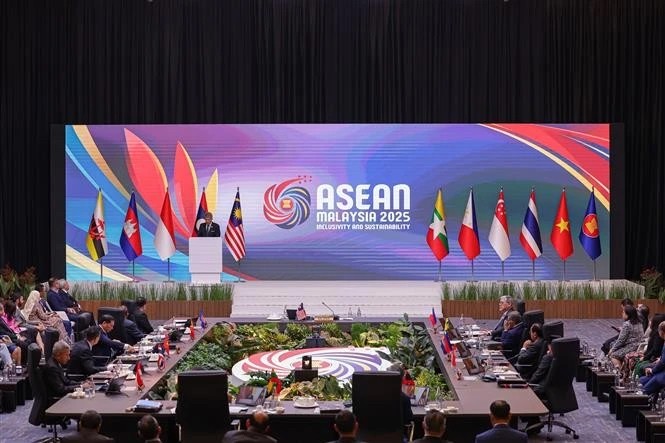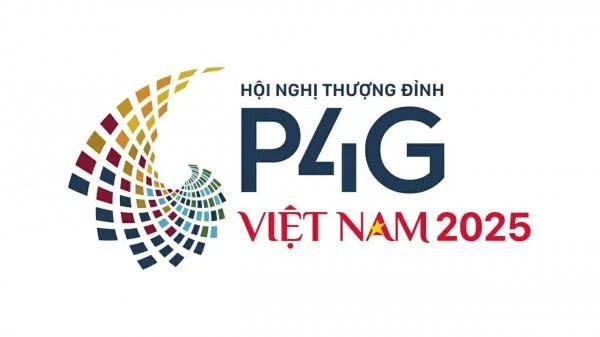Vietnam News Today (Oct. 31): Vietnam a Potential Investment Market For Retailers
| Vietnam News Today (Oct. 31) notable headlines WHO hails Vietnam’s effective control of COVID-19 pandemic Vietnam a potential investment market for retailers Trade turnover in October continues to see positive signs Some COVID-19 prevention and control documents removed Vietnam urged to speed up business environment reform Musical exchange honors Vietnam - Laos relations Numerous activities of Vietnamese students organized abroad Dutch PM’s Vietnam visit hoped to lift bilateral relations to new height Foyer Vietnam – a place to connect overseas Vietnamese in France |
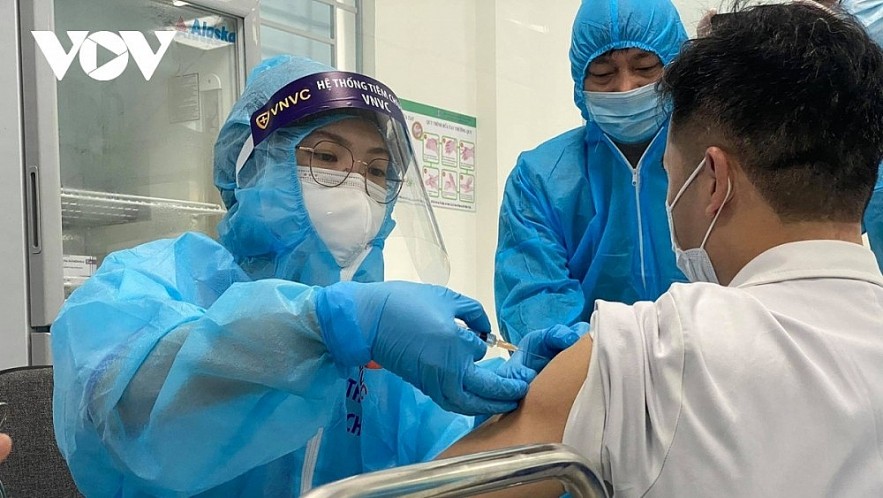 |
| Vietnam has stepped up the vaccination campaign during the height the pandemic to increase the vaccine coverage nationwide. |
WHO hails Vietnam’s effective control of COVID-19 pandemic
An official of the World Health Organization (WHO) has lauded Vietnam’s recent COVID-19 control efforts, stating that the country has set an exemplary role model in response to the pandemic.
Dr. Angela Pratt, representative of the WHO in Vietnam, said the country has successfully controlled the number of deaths and fresh infections thanks to the timely deployment of effective social and public health measures, cited VOV.
After initially receiving COVID-19 vaccines, the country launched an urgent vaccine coverage campaign by delivering shots to all citizens in every corner of the country, said Dr. Pratt at a national conference reviewing COVID-19 control efforts which was held on October 29 in Hanoi.
According to the WHO official, the success of the vaccine campaign enabled the country to swiftly reopen its doors and quickly reboot its economy to maximum capacity.
Vietnam’s response to COVID-19 has therefore become a reference model for many countries worldwide, she noted.
In her opinion, the country did a good job in swiftly detecting, tracing, isolating, and responding to outbreaks, as well as by closing its borders and enforcing a blockade in affected areas.
Besides having a contingent of devoted healthcare workers, the country acquired vaccines from various sources and immediately deployed a vaccination campaign nationwide aimed at achieving herd immunity as soon as possible.
The COVID-19 fight received great support from people of all social strata, and more importantly was the leading role of the Government and the National Steering Committee for COVID-19 Prevention and Control, said Dr. Pratt.
She assured that the WHO would provide continued support for Vietnam in reviewing and updating its pandemic response plan in the future.
At the event, delegates examined lessons learned and proposed directions after more than three years of combating the pandemic. Prime Minister Pham Minh Chinh also announced the completion of the tasks of the National Steering Committee for COVID-19 Prevention and Control.
Vietnam recorded the first COVID-19 infection on January 23, 2020. So far it has logged 11,624,100 infections and 43,206 deaths.
Vietnam a potential investment market for retailers
Vietnam, with a population of nearly 100 million people, is considered a potential investment market for famous retailers around the world, therefore, many foreign retailers have increased their investments.
According to the Ministry of Industry and Trade, Vietnam's retail market has a scale of more than US$142 billion , 16% of which comes from e-commerce. This scale is forecast to increase to US$350 billion , or nearly 2.5 times higher, by 2025.
The retail based on e-commerce platforms is also growing at an exponential rate. E-commerce businesses in Vietnam gained a revenue of US$14 billion by 2022, and the revenue is expected to reach US$32 billion by 2025.
These figures show the huge potential of Vietnam's retail market for enterprises at home and abroad.
A supermarket is still considered an attractive retail option in Vietnam, with diverse products, a seamless customer experience, and guaranteed product quality.
Data from Euromonitor shows that supermarket revenue in 2023 is estimated to reach about VND110 trillion (US$4.5 billion), an increase of 8.8% over the previous year.
These figures confirm a significant change in consumer shopping behaviour.
Vietnam has witnessed excitement in the domestic retail market from the first months of the year until now, when a series of big brands in the foreign retail industry has announced an increase in investment capital to this market.
Among them, MUJI - a famous retail brand for lifestyle, leather goods, and office furniture from Japan, has expanded its retail system in Hanoi and HCM City to 11 stores.
Meanwhile, Uniqlo - another big brand from Japan, also opened its 19th store in Hanoi, which is the fourth new store in the first half of 2023.
Additionally, in recent years, many large Thai enterprises have also evaluated Vietnam's retail market as one of the most potential and attractive markets.
Therefore, Central Retail Group, a giant in Thailand's retail industry, has announced a schedule to increase investment capital in Vietnam to US$1.45 billion (35 trillion ) in the period of 2023 - 2027, along with the goal of doubling the number of stores and supermarkets in Vietnam to 600 in 57 out of 63 provinces and cities. This is considered the largest investment ever announced by Central Retail.
To implement those goals, this year, the company has spent about 4.1 trillion in the Vietnam market, focusing on developing essential foods businesses, stabilising prices, and restructuring electronic stores.
Central Retail also aims to become the largest multi-channel retailer in the food industry, and the second largest investor in the shopping centre segment in Vietnam's real estate market by 2027.
Meanwhile, local retailers still dominate the domestic market, accounting for 70 - 80% of total retail sales points nationwide. There are big brands with thousands of sales points such as WinMart, Co.op Mart, and Bach Hoa Xanh.
However, foreign retailers' investment in the Vietnam market also puts certain pressure on domestic retailers. This situation urges domestic businesses to find ways to compete with foreign rivals.
In the past few years, Vietnamese businesses expanded their retail market share strongly in the segment of supermarkets and convenience stores, according to VNA.
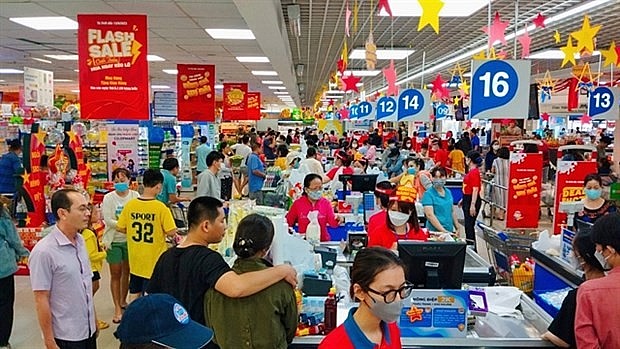 |
| Supermarkets' revenue in 2023 is estimated to reach about 110 trillion VND (4.5 billion USD), an increase of 8.8% over the previous year. (Photo: tapchicongthuong.vn) |
Of which, in mid-2018, Saigon Co.op acquired the entire retail system of Auchan (France) in Vietnam. In 2019, Singapore's Shop&Go also sold its business in Vietnam to VinCommerce.
Last year, THISO International Commerce and Services Corporation (THISO), a subsidiary of THACO Group, completed the acquisition of the Republic of Korea (RoK)’s Emart Inc’s business in Vietnam.
Along with implementing the merger and acquisition (M&A) activities with foreign brands in Vietnam, many domestic retailers have also expanded their retail systems in the domestic market.
Notably, Vingroup's Vincom Retail system owns more than 80 shopping centers nationwide. The WinMart and WinMart retail chains, with more than 3,500 convenience stores, are constantly opening new sales points.
Although the market is very competitive, economic experts still believe that Vietnamese retail businesses will have a solid foothold in the domestic retail market due to the advantages of understanding Vietnamese consumers, implementing digital transformation, and restructuring human resources.
To maintain their market shares, expert Vu Vinh Phu said that Vietnam companies need to improve in all aspects, from training professional human resources to building modern infrastructure, meeting the needs of the digital age to continue development in the retail sector.
Retail enterprises must always link to producers of Vietnamese goods, especially agricultural and food products, to ensure stability for the input of the distribution system.
Also, according to Phu, the domestic retailers are now mostly small and medium-sized enterprises, and there is no large retail group. Therefore, a joint venture with foreign retailers is necessary.
The newly published report of Rong Viet Securities (VDSC) predicts that the retail industry will slightly recover in the second half of 2023 and improve more clearly in 2024. Market leaders will continue to grow their market share after the slowdown.
Retailers will increasingly target the Northern regions, where modern trade channels have not yet gained substantial traction. However, they will first focus on consolidating their market share in the South before tapping into these untapped markets. Urbanisation will also play a role in shaping consumer behaviour, allowing for the expansion of modern retail networks in Tier 2 and 3 areas, according to the report.
To restore consumer demand in the last months of the year, localities are ready with promotion programs. In Hanoi, this year's promotion programs last longer and focus on each kind of goods according to each month's theme.
Tran Thi Lan Phuong, Acting Director of the Hanoi Department of Industry and Trade, said the department has received 21,000 trade promotion programs from 4,000 businesses registered to participate, double last year's number, and continues to add more.
For example, in November, the "Promotion Month" event is deployed in the city with participants being enterprises, production, and business facilities of all economic sectors.
Also in November, the event "Hanoi Midnight Sale 2023" will attract about 200 businesses, shopping centers, supermarkets, convenience store chains, production, and business facilities.
The Ministry of Industry and Trade also said that from now until the end of the year, the ministry will direct the people's committees of cities and the departments of industry and trade to promote the consumption stimulus program associated with stabilising the market of goods for the Lunar New Year in 2024, and organising the cultural and tourism events to both attract tourism and increase purchasing power.
Businesses also said that many policies of the Government, such as reducing value-added tax and increasing the base salary from July 1, are expected to increase consumers' purchasing power, contributing to the recovery of GDP in 2023.
The experts also believed that the State's efforts to promote consumption and the businesses' diverse business strategies are helping the business of the retail industry be better in the last months of the year.
Trade turnover in October continues to see positive signs
Vietnam’s trade turnover in October reached US$61.62 billion, up 4.1% month on month and up 5.6% year on year, according to the latest data from the General Statistics Office.
Businesses raked in US$32.31 billion from exports, up 5.3% month on month, and spent US$29.31 billion on imports, up 2.9% month on month, resulting in a trade surplus of US$3 billion.
Statistics indicate that the 10-month import-export value hit US$557.95 billion, down 9.6% year on year. Businesses earned US$291.28 billion from exports, down 7.1%, and purchased US$266.67 billion worth of goods, down 12.3%, resulting in a trade surplus of US$24.61 billion, reported VOV.
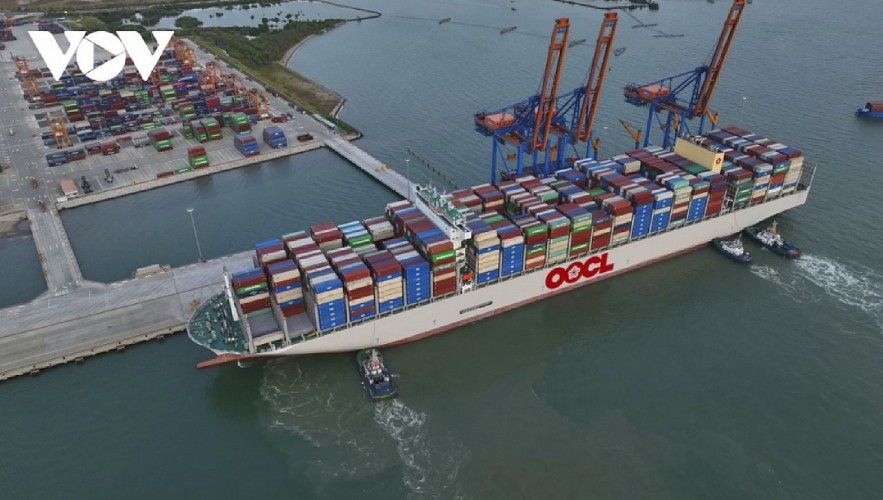 |
| Photo: VOV |
Most notably, the domestic economic sector saw a trade deficit of US$17.99 billion and the foreign-invested sector posted a trade surplus of US$42.6 billion.
The United States remained the nation’s largest export market with turnover reaching US$78.6 billion, while China made up the biggest consumer of Vietnamese goods with turnover being recorded at US$89.8 billion.
Some COVID-19 prevention and control documents removed
Deputy Prime Minister Tran Hong Ha has signed Decision No. 1269/QD-TTg on removing some documents on COVID-19 pandemic prevention and control that were issued by the National Steering Committee for COVID-19 Prevention and Control and the Prime Minister.
One of the abolished documents is the Prime Minister’s Decision No. 447/QD-TTg dated April 1, 2020 announcing the COVID-19 pandemic, cited VNA.
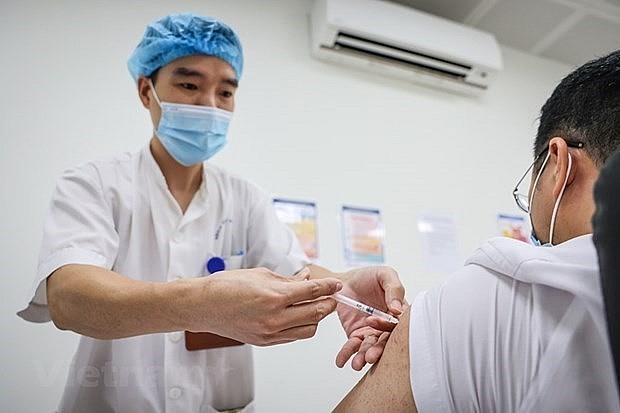 |
| A man is vaccinated against the COVID-19. (Photo: VNA) |
Other documents include 20 decisions, 13 official dispatches and four official telegrams issued by the National Steering Committee for COVID-19 Prevention and Control, and eight directives and three decisions of the Prime Minister.
The first COVID-19 cases in the world were recorded in late December 2019 in Wuhan, China. In Vietnam, the first case was confirmed on January 23, 2020.
With the participation of the entire political system, the Party, army and people implemented drastic, synchronous and timely measures to prevent and control the pandemic that is an unprecedented, complex, and unpredictable global pandemic.
Vietnam had gradually prevented and effectively controlled it. The country’s achievements in the fight against the COVID-19 pandemic have made an important contribution and created favorable conditions for socio-economic recovery and prosperity in most fields.
On October 20, 2023, Vietnam officially moved COVID-19 from group A to group B infectious disease.
Earlier, on January 29, 2020, the Ministry of Health classified COVID-19 as a Group A infectious disease which comprises particularly dangerous infectious diseases that can spread very fast and on a large scale and have a high mortality rate or unclear causes. Meanwhile, Group B covers the infectious diseases that can spread fast and cause deaths.
Vietnam urged to speed up business environment reform
Economists have voiced concern about the slowdown of the business environment reform recently. The old required business conditions, which were removed, have returned to cause difficulties for enterprises.
The 2022 PCI (Provincial Competitiveness Index) report released by the Vietnam Confederation of Commerce and Industry (VCCI) showed that 35 percent of businesses said they would scale up their business in 2023-2024, just one percent higher than in 2021.
Meanwhile, the number of enterprises planning to scale down their business or shut down was 10.7 percent, a relatively high level since 2019. The growth rate and business efficiency of private enterprises are declining and lower than that in 2016-2020.
Analysts pointed out that the worse business environment is a reason that has affected private enterprises. Businesses complain that they have to bear pressure because of inconsistent and unreasonable policies. Regulations change regularly, while legal documents are controversial and overlapping, which makes it difficult for enterprises to plan their business.
A regulation on controlling fire prevention and fighting alone, for example, has caused many enterprises to stop operations, VNN reported.
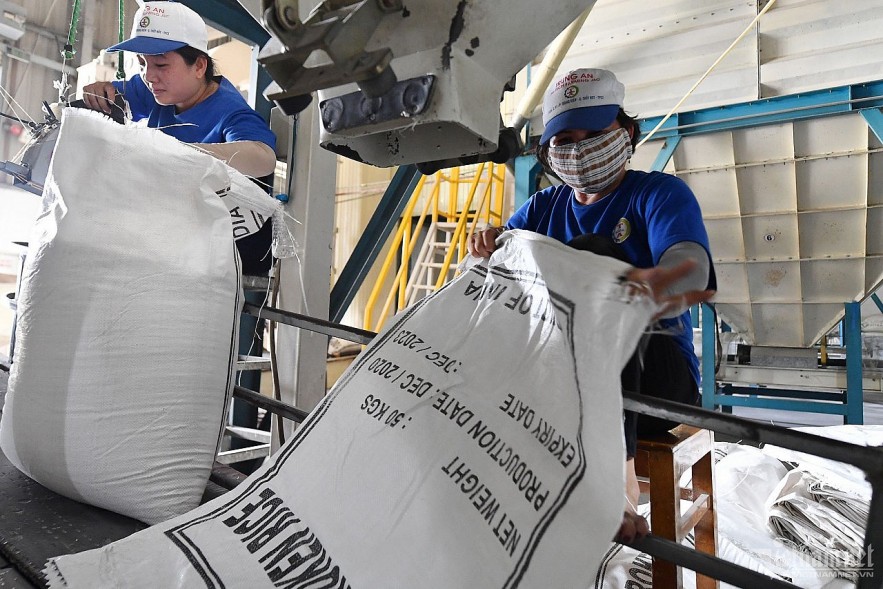 |
| Photo: VNN |
The government in recent years has made great efforts to reform the business environment, remove required unnecessary business conditions and cut the number of conditional business fields. However, after the old business conditions were cut, new requirements on administrative procedures appeared.
Complicated administrative procedures have always been a burning issue that hinders activities in the national economy.
A VCCI survey found that enterprises’ capability to predict the changes in laws has been declining. The number of enterprises that can foresee changes in regulations has dropped from 14.29 percent in 2013 to below 5 percent now. The decline in policy predictability has been a consistent trend for nearly 10 years.
This is a worrying problem for Vietnam as its businesses cannot predict business prospects because policies always change suddenly.
At some meetings between businesses and state management agencies, businesspeople say that what they need now is not financial support, but predictable, transparent, stable, and consistent policies.
The other problem that bars enterprises’ way is state officers’ attitudes. They avoid handling issues and pass the buck for fear that they may make mistakes which will end up with imprisonment.
As a result, it takes a long time to solve a question. Businesspeople estimate that it takes two years to fulfill business procedures. The business environment is getting worse, while the spirit of officials at all levels to solve problems is deteriorating.
The only way to settle the problems is institutional reform. The government needs to warn ministries against setting up more barriers for enterprises when releasing new legal documents.
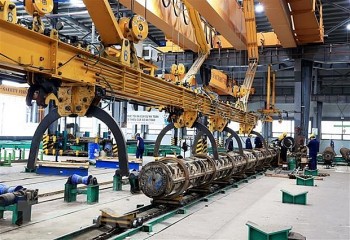 | Vietnam News Today (Oct. 28): Vietnam ready to serve as bridge helping EU connect with Southeast Asia; Mongolian President to visit Vietnam next week; Vietnamese ... |
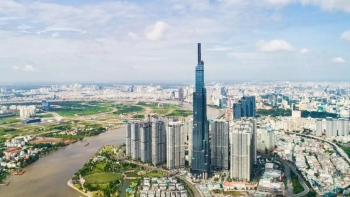 | Vietnam News Today (Oct. 29): Vietnam’s Growth Engine is Still in Full Swing Vietnam News Today (Oct. 29): Vietnam welcomes over 1 million int'l visitors in fourth consecutive month; Vietnam’s growth engine is still in full swing; PM: ... |
 | Vietnam News Today (Oct. 30): Vietnam, EU Hold 4th Joint Committee Meeting in Brussels Vietnam News Today (Oct. 30): Success in COVID-19 combat reflects Vietnam’s mettle, wisdom; Vietnam, EU hold 4th Joint Committee meeting in Brussels; HCM City promotes ... |
In topics
 National
National
Vietnam News Today (May 31): Vietnam Strongly Supports Laos’s National Development
 National
National
Vietnam News Today (May 30): Vietnam, Venezuela Reinforce Ties Through People-to-people Diplomacy
Recommended
 National
National
Vietnam News Today (May 27): Vietnam Treasures Multifaceted Collaboration with France
 National
National
Vietnam Commits to Building an Inclusive, Sustainable and Cohesive ASEAN
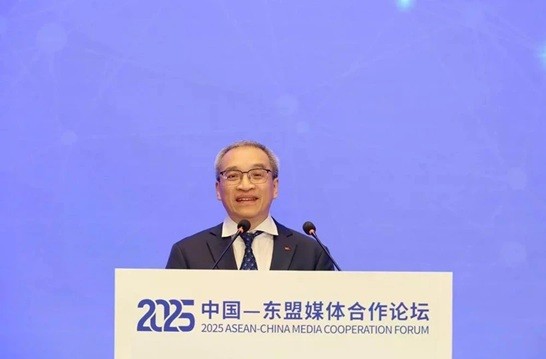 National
National
Vietnam Proposes Vision for Responsible Digital Journalism Cooperation
 National
National
Vietnam News Today (May 25): Vietnam, Serbia Hold Political Consultation
Popular article
 National
National
Vietnam News Today (May 31): Vietnam Strongly Supports Laos’s National Development
 National
National
Vietnam News Today (May 30): Vietnam, Venezuela Reinforce Ties Through People-to-people Diplomacy
 National
National
Vietnam News Today (May 29): Vietnam and Hungary to Expand Cooperation into New Areas
 National
National




